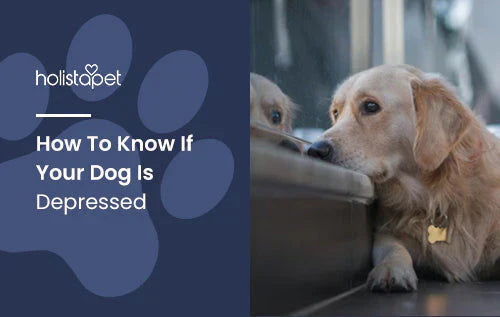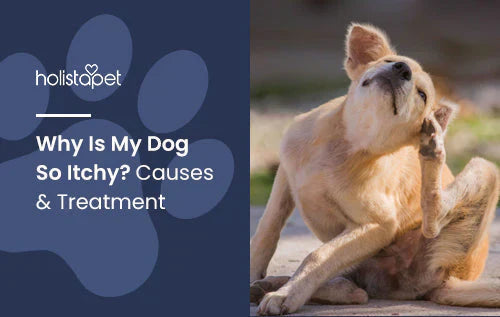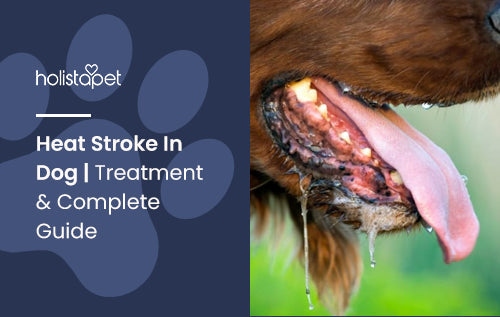Do you ever look at your sad dog and think you need to get the little guy a shrink? Noticing that your dog is depressed is heartbreaking because unless you're fluent in canine, you can't talk to them about it. Although there isn't enough data to prove whether dogs can experience depression, there is anecdotal evidence to show that dogs may have feelings of depression or sadness. However, clinical psychologists believe that dogs do not experience long-term depression.
Sometimes, there are specific reasons your dog may be depressed. For example, they may be experiencing grief, like the loss of an owner or partner (another animal you had in the house).
Can a Dog Be Depressed?
Simply put, yes. Dogs can experience depression, but not in the same clinical way that humans do. Most of the time, the depression doesn't last long, but that's not always the case. Sometimes, canine depression can linger and this could have negative results. For example, if the sadness leads to dramatic weight loss, it can initiate some severe health issues.
Why Do Dogs Get Depressed?
Why does my dog look sad? You may believe you are your dog's whole world, and you basically are! Still, your dog is accustomed to a specific lifestyle. Significant changes in your life can directly affect their life. Some of the main reasons dogs experience depression are environmental shifts, weather and seasonal changes, loss of a companion, and more. Let's examine some of these common causes.
Environmental Changes
Environmental shifts can be anything from moving locations to the loss of a human member. Family members returning to school at the end of the summer or moving away can take a toll on your pet. Similarly, your pet may feel uncomfortable or even confused with their "new" surroundings or environment if you move.
Schedule or Routine Changes
Routine and schedule shifts can be another source of dog depression. Canines are habitual creatures and when their routine changes abruptly, their mood might follow. Luckily this type of depression usually resolves itself once the pet gets used to the new schedule.
Separation Anxiety
Why look my dog looks sad? Separation fears can become daunting for worrisome canines. If you constantly leave for long periods of time your dog may begin to get lonely or they may even think you're not returning. Over time, chronic separation can turn into dog depression.
Your Own Emotions
Your own depression can actually rub off on your dog. Please keep in mind that dogs often connect emotionally to their owners and they tend to feed off our energy whether it's negative or positive. In other words, the problem might be stemming from the owner.
Weather Changes
Weather and seasonal changes can affect our moods, and they can affect your dog's emotions as well. Consecutive days of rain and having to stay home could make your dog feel gloomy. Also, if you move to a different region, those weather changes can affect your dog.
Companionship Loss
The loss of a companion is one of the main reasons a dog can feel depressed. When they lose another dog they grew up with it can hurt them. Animals create strong bonds with one another, so it is difficult for them to move on when one of them passes.
Longterm Illness or Pain
Chronic discomfort is often associated with depression symptoms in canines. If your pet is always tense or sore, over time it may lead to depression.

How Can You Tell If Your Dog Is Depressed?
Why does my dog look sad all the time? Dogs portray similar characteristics as humans when dealing with depression. For example, they become uninterested in the things around them. Some pooches hide in the back of the closet or under a bed to shield themselves from sunlight. In most cases, your hound needs a little extra TLC from you.
Here are some depression symptoms to look for when trying to diagnose your dog:
Weird Sleeping Habits
How long does dog depression last? If you didn't know, your dog sleeps when you're not around. Nevertheless, once you arrive home, your pooch should be excited to see you. If you notice that your dog is continuing to sleep once you return home or doesn't show the same type of aggression towards the mailman, there might be something wrong.
Excessive Licking or Chewing
Usually, you'll notice hounds licking or biting on their skin to treat cuts and soothe itching. When a dog is going through depression, they lick and chew their paws to bring emotional relief.
Loss of Interest
Once your furry friend stops responding to trigger words in a high-pitched voice, you'll know something is wrong. Your dog should be excited to go on walks, receive treats, and play with toys.
Diet Changes
Some pets fluctuate in weight when they are depressed. It is similar to what we go through when we experience depression. Food may not interest an unhappy dog or unenthused canine.
Retreating or Hiding
Often, when we are feeling blue we don't want to be around others and our pups are no different. It is common for canines to retreat into hiding when they are not feeling up to par.
Lethargic
Canines often lack their normal amount of energy when they are feeling down. If you notice your pooch is lacking their usual personality, spunk, or stamina they may be getting depressed.
Most of the symptoms of depression mimic other health issues your dog may have. If you notice these symptoms become severe, you must take your pup to your local vet to assess the symptoms.

How To Cheer Up A Depressed Dog
Don't worry! There is light at the end of the tunnel for your canine friend. Dog depression can be adjusted with the right techniques.
Get Some Extra Sunshine
Take your dog out more often. Sitting out in the sun will make you and your dog happier. It can promote the release of serotonin which are natural mood-boosting hormones. Sunlight will also provide your dog with a healthy dose of vitamin D. You can pack a little picnic, take a few dog toys, and sit in the grass to enjoy some fresh air.
Provide CBD
Cannabidiol (CBD) works with the internal endocannabinoid system (ECS) in humans and in pets. You can add CBD treats for dog in their daily diet or just supply it temporarily until you see the results you desire. CBD may promote a positive mood and provide extra comfort during tense times! Research suggests that CBD's potential benefits for depression are related to its positive effect on serotonin receptors in the brain.
Related Product: Holistapet CBD Calming Chews For Dogs
Make Friends
If your furry friend is neutered/spayed, you can take them to a dog park. Sometimes socializing with other dogs will do the trick, especially if they lost a friend. You can also adopt a new friend! The new friend may be precisely what your bud needs to get through their funk.
Be Patient
It's important to remember that, for the most part, doggy depression is short-term. We need to allow time to pass and be patient. Be there for your buddy when he is feeling low, but also encourage happy days.
Give a Little Extra Love
Although doggie depression is (usually) short-term, it can persist if the trigger is still present. Just like our furry friends can cheer us up when we're sad we can return the favor! Some extra affection will help your pooch tremendously, especially if you believe your dog's depression is linked to being lonely for long hours.

When Should I Go To The Vet for Dog Depression?
You should go to the vet if you notice your dog's symptoms getting worse. Keep in mind that these symptoms can also come from your hound feeling unwell. Please take them to the vet the first week you notice these changes if it is out of nowhere. However, if you know your dog is grieving, you can give it a month and monitor his weight and eating habits at home. Your dog needs to get the proper nutrition and care, or else they can start to suffer some serious health issues.
Final Thoughts
There is only so much you can do as a pet owner. Petting and kissing your dog regularly can make him feel included. Speak to your dog in that high-pitched voice you will never use in public. You know, the one that makes your dog tilt his head. It's difficult seeing your best friend struggle with depression, but you can speed up the healing process and help him through the tough times (just like when he helped you during your tough times.) The HolistaPet family wishes you good luck with your furry friend and their dog depression.


 CBD Oil for Dogs - Fast Acting
CBD Oil for Dogs - Fast Acting
 Chicken Flavored CBD Oil For Dogs - Easy Dose
Chicken Flavored CBD Oil For Dogs - Easy Dose
 Salmon Flavored CBD Oil For Dogs - Highly Rated
Salmon Flavored CBD Oil For Dogs - Highly Rated
 CBG Oil for Dogs and Cats - Loved by Thousands
CBG Oil for Dogs and Cats - Loved by Thousands





Leave a comment
All comments are moderated before being published.
This site is protected by hCaptcha and the hCaptcha Privacy Policy and Terms of Service apply.